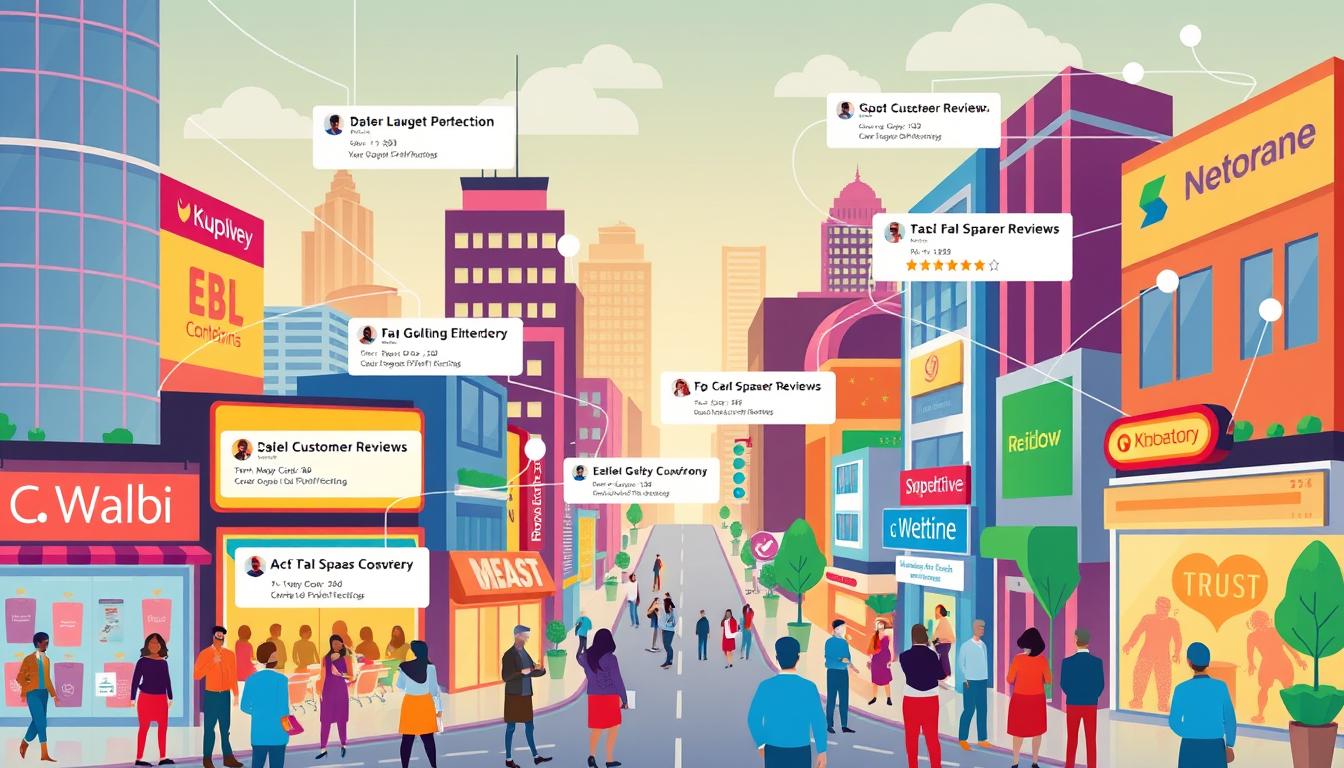Reputation marketing is key for growth. A company’s reputation is like money, shaping how people see it, how loyal customers are, and its financial health. It’s about being proactive in how people talk about and see your brand.
By investing in reputation marketing, a business can boost its image, keep customers coming back, handle bad reviews, and attract top talent. It also opens doors for partnerships and helps a company stand strong even in tough times. With social media and the internet, managing your reputation is vital for staying ahead in the market.
Studies show that most people won’t choose a company with just a three-star rating from online reviews. But, 94% will go for a four-star rating. Also, seeing positive reviews makes people 74% more likely to reach out to a company. Reputation Return offers affordable ways to protect and improve your online image.
Understanding Brand Reputation in Today’s Digital Landscape
In today’s world, a brand’s reputation is shaped by what people think of it online. Social media and fast digital communication have changed how we see brands. Now, people can share their thoughts anytime, making online reputation more important than ever.
Digital messages can quickly spread, affecting a company’s image. Businesses need to manage their online presence well. They must talk to customers on different digital platforms. This new world makes keeping a good reputation a constant task.
The Evolution of Online Brand Perception
How we view brands has changed a lot in the digital age. REI was named the best brand for social impact by Forbes, showing how important being good and ethical is today. People spend a lot of time thinking before they buy, making a good online reputation crucial.
Impact of Digital Communications on Business Image
Digital messages have a big effect on how we see brands. A bad Tweet can cost a company a lot of money, showing how fast negative news can spread. New generations like Gen Z and Gen Alpha will be important to reach, needing real messages and care for the planet.
New tech offers chances for brands to improve their online image. Augmented reality is being used in shopping, demos, and events, like IKEA’s app for seeing furniture at home. Also, metaverse and AI can make ads and content more personal, based on what people like. Ask for a free consultation now.

The Financial Impact of Reputation Management
Reputation management greatly affects a business’s finances. A study by Weber Shandwick found that up to 76% of a company’s value comes from its reputation. Businesses with good reputations often do better than their rivals, with higher stock prices and returns.
A good reputation can boost customer loyalty, sales, and financial health. On the other hand, a bad reputation can hurt sales, lose customers, and cause lasting harm. It’s crucial for businesses to invest in reputation management to protect their market value, keep customers, and grow over time.
| Metric | Value |
|---|---|
| Percentage of market value attributed to corporate reputation (globally) | 63% |
| Percentage of market value attributed to corporate reputation (Brazil) | 76% |
| Percentage of market value attributed to corporate reputation (Mexico) | 75% |
| Percentage of executives who attributed at least 76% of their market value to company reputation | 33% |
| Performance of trusted companies compared to peers | Up to 400% higher |
| Likelihood of customers to repurchase from a trusted brand | 88% more likely |
| Percentage of investors who consider a company’s reputation “very important” when deciding on investments | 93% |
CEOs and leaders must see reputation as a valuable asset. They should invest in reputation investment to keep their finances strong and grow their market value over time.

Building Trust Through Reputation Marketing
Building customer trust is key to successful [https://reputationreturn.com/about-us/] reputation marketing. It’s about creating real connections with customers, using their feedback, and managing online reviews well. This way, businesses can build a strong, positive image online that people can relate to.
Creating Authentic Customer Relationships
Real customer relationships start with clear talk, consistent messages, and keeping promises. Companies that focus on these can earn trust and loyalty. These are vital for lasting success.
Leveraging Social Proof and Testimonials
Positive reviews and testimonials are key to showing credibility and winning over new customers. Businesses that encourage happy customers to share their stories can greatly increase customer trust and social proof.
Managing Online Reviews and Feedback
Handling online reviews and feedback well is crucial for reputation marketing. By quickly responding to all reviews, companies show they care about customer satisfaction and are ready to fix issues. Good reviews can boost a brand’s online reputation, while dealing with bad feedback can prevent harm.
Reputation Return provides affordable reputation marketing services. They help businesses keep trust with their audience by managing customer relationships, social proof, and online reviews smartly.
| Key Statistic | Impact |
|---|---|
| Businesses with a positive online reputation have reported an approximate increase in sales by 15% compared to those with a negative reputation. | Positive online reputation is directly linked to increased sales and revenue. |
| 88% of customers are likely to use a business based on how it responds to online reviews. | Timely and effective management of online reviews is crucial for customer trust and retention. |
| 50% of consumers trust online reviews as much as personal recommendations from friends and family. | Social proof in the form of online reviews has a significant influence on purchasing decisions. |
Customer Loyalty and Retention Through Reputation Management
Good reputation management helps keep customers coming back. When people trust a brand, they want to buy from it. Using smart reputation marketing strategies can make a big difference. This includes being open, honest, and providing top-notch service.
Companies that focus on their reputation keep more customers. This means more money from loyal customers and less spent on getting new ones. By giving great experiences and managing their online image, businesses build a loyal fan base. These fans not only buy more but also tell others about the brand.
Studies show that 60% of people prefer to shop with companies that have good online reviews. Turning a 1-star review into a 5-star one can boost sales by up to 9%. Also, replying to reviews can make customers more likely to recommend the brand, showing how key reputation management is.
| Statistic | Insight |
|---|---|
| 80% of consumers trust online reviews as much as personal recommendations | Positive online reviews build trust and credibility, influencing purchasing decisions. |
| Encouraging positive online reviews can result in a 354% increase in conversion rates | Proactive reputation management through review generation can significantly boost sales. |
| Businesses that respond to online reviews at least 25% of the time have up to a 35% higher retention rate | Actively engaging with customer feedback demonstrates a commitment to customer satisfaction. |
With the right reputation marketing strategies, businesses can build a loyal customer base. This leads to higher retention rates and long-term success.
The Role of Social Media in Reputation Marketing
Social media is key in today’s digital world. Almost 60 percent of people use social platforms. Businesses must pay attention to their online presence and how they interact with others.
Social media brings both chances and challenges for managing a brand’s image.
Platform-Specific Strategies
Every social media platform is different. Businesses need to tailor their approach for each one. They must match their message and content to the audience on Facebook, Twitter, Instagram, and LinkedIn.
By understanding each platform, companies can create a strong online image. This image supports their brand’s reputation.
Monitoring and Responding to Social Mentions
Keeping a good social media image means watching and responding fast. Businesses use tools to track what people say about them. This helps them see how people feel and what’s trending.
Quick and right responses show a company cares about its customers. This can change how people see the brand. It’s important to fix problems before they get worse.
Social media is very powerful in shaping social media reputation, online brand management, and reputation monitoring. With a smart plan, businesses can earn trust, build real connections with customers, and protect their brand.
Crisis Management and Reputation Recovery
Any business can face a reputation crisis. How a company handles these situations can greatly affect its image and customer loyalty. It’s crucial to have good crisis management and reputation recovery plans to protect and restore a company’s online image.
Effective crisis management means being ready, acting fast, and being open in all communications. Companies should have a clear crisis communication plan that outlines roles and steps to take during a crisis. This approach helps keep a company honest and reliable, gaining customer trust and possibly influencing competitors.
Reputation recovery aims to rebuild trust and credibility after a crisis. This might include public apologies, fixing problems, being more open, and sharing positive messages over time. The goal is to show a real commitment to solving the issue and preventing it from happening again. Successfully managing a crisis and recovering can make a brand stronger and more loyal to customers.
Good crisis management and reputation recovery are key for businesses to keep their online reputation strong and customer trust. By being proactive and taking quick, open actions, companies can set themselves up for success in the digital world.
| Statistic | Value |
|---|---|
| Companies facing a public crisis often have customers demanding answers through various channels | – |
| Poorly handling a crisis can lead to loss of trust from current customers, attract negative word-of-mouth, and potentially result in legal fees | – |
| Only 30% of consumers highly trust the companies they do business with | 30% |
| 88% of consumers consider trust in a company a top factor in their buying decisions | 88% |
| 59% of companies faced a ransomware attack in 2024 | 59% |
| U.S. companies recalled 3,301 products in 2023 | 3,301 |
| More than half of consumers say they’ve avoided a brand due to a product recall | – |
| 69% of people believe that a brand owning its mistakes is effective in building trust | 69% |
These numbers show how important a strong crisis management plan is. They also highlight the big impact of effective reputation recovery on a brand’s success over time.
Employee Advocacy and Internal Reputation
Creating a strong internal brand reputation is key for any business. Employees can greatly influence how people see the company. By teaching them about the company’s values, mission, and key messages, they can share the brand positively.
Good internal communication strategies help shape the company culture. They make sure employees know and support the company’s reputation goals. A positive work environment and trust can boost the internal brand reputation.
Companies with strong internal reputations see happier employees and better productivity. They also have lower turnover rates.
Training Staff as Brand Ambassadors
A strong employee advocacy program can help the brand reach more people. Employees sharing content can improve the company’s online presence, especially for small businesses. This personal touch can make the brand more trustworthy and attractive.
Internal Communication Strategies
Good internal communication is essential for a positive corporate culture. It keeps employees aligned with the company’s goals. Regular surveys help see how well employee advocacy works.
Tracking how well posts are doing helps understand the program’s success. Analytics show the reach, engagement, and impact of employee advocacy efforts.
| Statistic | Value |
|---|---|
| Consumers trust personal recommendations above all other forms of marketing | 93% |
| Employees typically have more social connections than a company | 10 times more |
| Consumers have stopped buying from a brand that treats its employees poorly | 64% |
Getting feedback from employees is crucial for improving the program. The Sociabble platform helps track how well employees are doing. It shows who is doing well and what content works best.
Measuring Reputation Marketing Success
It’s key to check how well reputation marketing works. This shows the return on investment (ROI) and helps improve strategies. By looking at important reputation metrics, companies can see how people view their brand. They can also find spots to get better.
The Net Promoter Score (NPS) is a common tool. It shows how loyal customers are by asking if they’d suggest the brand to others. Social media sentiment analysis helps understand the brand’s online image. It looks at the feelings and amount of mentions on different platforms.
Another key metric is the share of voice. It compares the company’s media presence to its rivals. This shows chances to make the brand more seen and influential in the market.
- Employee satisfaction scores
- Media coverage quality and quantity
- Website traffic from branded searches
- Financial indicators like stock price, revenue growth, and customer lifetime value
Doing regular reputation checks and comparing to competitors is smart. It lets companies see how they’re doing and where to get better. By using many reputation metrics, businesses can make smart choices. This helps them manage their reputation well for the future.
Long-term Benefits of Reputation Investment
Investing in reputation management brings big benefits to businesses. Market value enhancement is a key benefit, with studies showing a big part of a company’s value comes from its reputation. A good reputation can mean higher stock prices, more investor trust, and better handling of tough times.
Building a competitive edge through reputation means creating a unique and positive brand. This makes the company stand out from others. It leads to more loyal customers, the power to charge more, and attracting the best employees. Long-term reputation management builds goodwill that helps during tough times and supports steady growth.
Companies that focus on their reputation are ready to face market challenges and grab new chances. By focusing on their brand value, they get ahead and secure their future success.
Market Value Enhancement
Studies show a big part of a company’s value comes from its reputation. A strong and positive brand reputation can lead to higher stock prices, more investor trust, and better handling of tough times.
Competitive Advantage Building
Good reputation management lets businesses create a unique brand identity. This makes them stand out from competitors. It leads to more loyal customers, the power to charge more, and attracting the best employees, all helping to keep a strong competitive edge.
| Benefit | Impact |
|---|---|
| Market Value Enhancement | Higher stock prices, increased investor confidence, greater resilience during downturns |
| Competitive Advantage Building | Increased customer loyalty, higher pricing power, ability to attract top talent |
Conclusion
Reputation marketing is now key to business success in today’s digital world. It affects everything from customer loyalty to financial growth. Companies need to watch and shape their brand image everywhere.
A good reputation brings many benefits, like more trust and a competitive edge. It’s worth the effort. Reputation Return helps businesses build and keep a strong online image for lasting success.
Online reviews and user content are crucial for 86% and 92% of consumers, respectively. Good reputation management attracts customers and builds trust. It’s essential for businesses to thrive.

